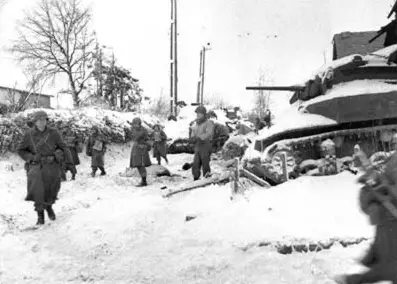Battle of the Bulge
German Backstory
Adolph Hitler was determined to force his way through the Allied troops, and decided to split them up by using a surprise blitzkrieg. This took place in northwest Europe on December 1944, when the Allied Forces were vulnerable to such an attack. With Germany attacking from Ardennes to Antwerp, they set up the perfect formation to catch American troops off guard. A blitzkrieg tactic is used in military campaigns to knock an enemy back quickly and suddenly, giving them little chance to recover from the initial attack. Blitzkriegs are all-out attacks that have a high risk to the attacking army but an equally high reward if successful.


United States Backstory
With the Americans caught off guard, Germany had the clear advantage. They continued their charged attack through St.-Vith, Houffalize, Bastogne and Elsenborn Ridge. The battles for the Americans were largely losses, as they desperately tried not to get overwhelmed by the might of the attacking forces. Germany attempted the very same tactic previously in 1870, 1914 and 1940. Yet the biggest disadvantage came specifically from Ardennes and its bad defenses. Inexperienced and unprepared, the American divisions were not able to stand up to the superior German forces.
The saving grace for the American forces came from Lieutenant General George S. Patton and his fearlessness in the face of danger. His Third Army was the perfect defense to sure up the falling American forces, which had already lost a considerable amount of their men. Brigadier General Bruce C. Clarke was also an important pillar in the battle, turning a previously hopeless St. Vith defense into a great counteroffensive.
With the Americans holding strong on several fronts, the battle became one of attrition with the Germans rapidly losing fuel and supplies in their attempt to push forward. The Battle was officially won by the Americans when Lieutenant General George S. Patton’s Third Army turned their sights to Bastogne and restored order.

Why Was the Battle of the Bulge Important?
It was a battle that could have easily been lost by the Americans, and in many ways is still considered a huge loss. Germany missed a rare opportunity to take down the American forces, but they managed a very destructive campaign since America suffered over 100,000 casualties. This was the toughest battle ever fought by the U.S. Army, and led to the biggest loss in any war. General Patton once again secured his place in the history books as a man of superior tactical skills.

Who Was Affected?
America was devastated even with the win, as 100,000 of their finest suffered. The U.S. 106th division was exposed for being unprepared, and one of the weaker divisions on the Army. They were near wiped out before the tide of the battle turned in their favor with reinforcements.
Germany suffered another heartbreaking loss in World War II, and is a story that would become quite familiar for the rest of the war. In the end they were close, yet not close enough.

Names to Remember
Lieutenant General George S. Patton was born November 11th 1885 and is a Purple Heart hero that fought in several wars. He was important in the Mexican Revolution, World War I and World War II. Patton was a powerful and imposing figure to any rival army, and a great leader that knew how to improvise when needed.
Brigadier General Bruce C. Clarke was born April 29th 1901 and was a hardnosed veteran in World War I, World War II and the Korean War. His skills on the battlefield were only match by other top Generals in the Army, which is why he was awarded the Grand Cross of the Court of Honor.

Important Facts
Here are some important things to remember about the Battle of the Bulge.
- The Battle of the Bulge took place on December 1944
- A blitzkrieg was used to separate the U.S. Forces and take them by surprise
- The Battle of the Bulge got its name when the Allied line that was resisting looked like a bulge
- There were over 100,000 American casualties in the battle

Conclusion
Germany lost the battle but did serious damage to the American forces. As close a call as the Battle of the Bulge was, it served as a wakeup call to American servicemen everywhere.



